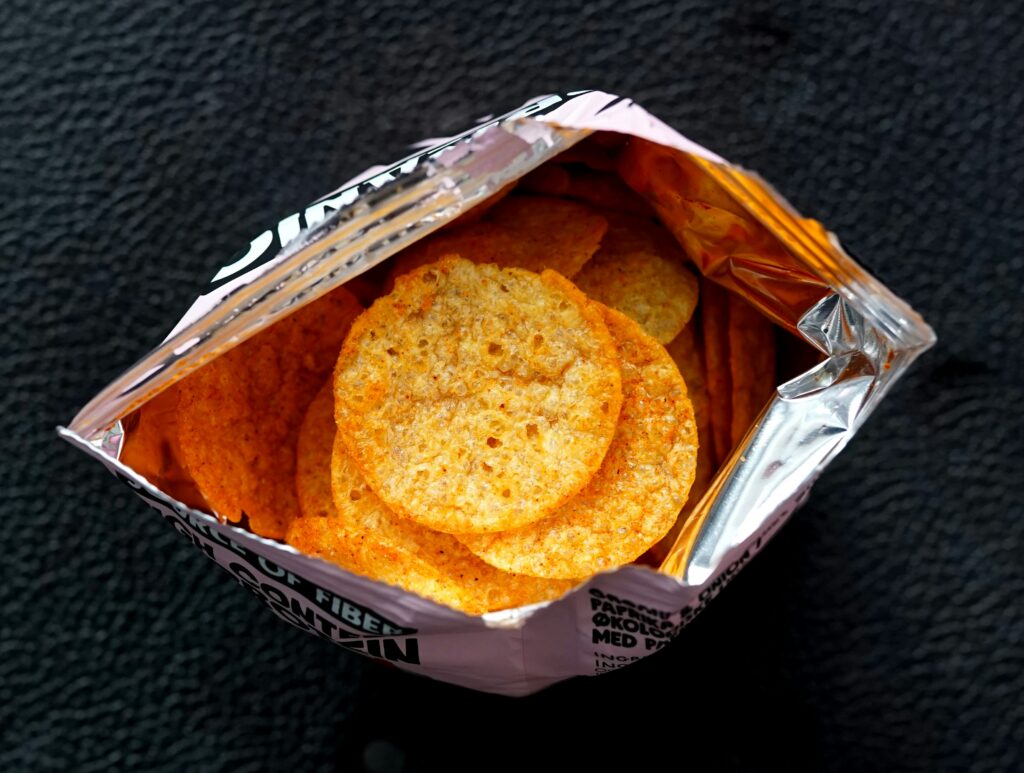This post is also available in Dutch .
It is a familiar scenario for many people: you take a bit of chips and before you know it, the whole bag is empty. But why is it so hard to stop eating crisps once we start? And why do you get tired of carrots more quickly?
The power of sugar, fat, and salt
According to Professor Esther Aarts, the irresistibility of snacks can be explained evolutionarily. In times of scarcity, it was crucial to ingest as many calories as possible. Our brain was therefore programmed to perceive foods containing sugar, fat and salt as highly rewarding. But those times have changed we see food everywhere these days. Subconsciously, however, our primal instinct is still active, Esther Aarts explained in the podcast ‘In a Nutshell’. This makes it difficult to keep measure.
On top of that, we are creatures of habit. When food is in front of us, we often finish it automatically. For example, there is evidence that portion size determines how much we eat.
A downward spiral
Besides habits, our feelings also play a big role. After a stressful day, many people reward themselves with something sweet. In itself, no problem, but if this becomes a pattern, the brain can lose control over eating behaviour. According to Esther Aarts, this can lead to overeating and eventually obesity, which further affects the brain she tells the Radboud Science Snacks podcast. It becomes even harder for these people to stay motivated to make healthy choices.
Indeed, overeating can lead to inflammation in the body, especially with fat accumulation around organs. These inflammations can reach the brain and affect motivation and self-control there. In the long run, this even increases the risk of dementia and depression.
What can you do about it?
Fortunately, in her new book ‘Waarom we een zak chips altijd in een keer leeg eten’, Aarts offers practical tips to break the vicious cycle. A few strategies:
- Saturate yourself: start meals with high-fibre and high-protein food, so you feel full faster.
- Pay attention while eating: not multitasking while eating, such as watching TV, helps you feel better when you have had enough.
- Put your food in a smaller bowl and eat it with a smaller spoon if you want to eat less. This seems to work even better than a smaller plate!
- Avoid temptations: put snacks out of sight and make healthy choices easier by preparing vegetable snacks, for example.
The role of gut bacteria
Besides behavioural changes, there is still much to discover about the biological mechanisms behind overeating. Aarts investigates the link between gut bacteria and brain: some gut bacteria seem to be able to prevent inflammation better than others, she explains in the NTR programme Focus (from minute 21:45).
With additional funding, Esther Aarts wants to further investigate how gut flora can protect against the negative effects of obesity on the brain. In doing so, she also investigates the role of food, as our gut bacteria thrive best on a high-fibre diet. So don’t forget the little friends in your tummy and eat plenty of vegetables, fruits, legumes and whole-grain cereals.
Esther Aarts’ research into the link between obesity, gut bacteria and the brain requires funding, which will allow Aarts to examine stool samples from participants with obesity from previous projects. Visit the Radboud Fund site for more information.
- Author: Dirk-Jan Melssen
- Buddy and editor: Lucas Geelen
- Translation: Siddharth Chaturvedi
- Editor translation: Vivek Sharma
- Image by THE ORGANIC CRAVE Ⓡ on Unsplash
